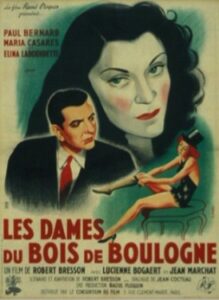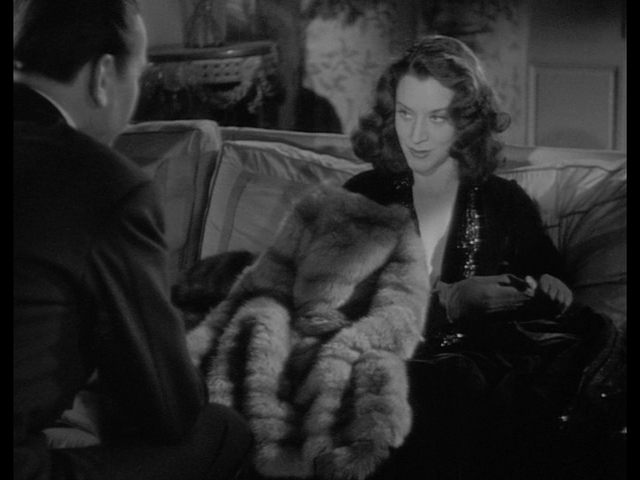“You don’t seem to realize where a woman’s scorn can lead.”
|

Synopsis:
A vengeful socialite (Maria Casares) plots to ruin her ex-lover (Paul Bernard) by scheming to have him fall in love with a penniless ex-prostitute (Elina Labourdette).
|
|
Genres, Themes, Actors, and Directors:
- French Films
- Love Triangle
- Revenge
- Robert Bresson Films
Review:
As noted so accurately in Jeff Stafford’s DVD review for TCM, this early film by minimalist French director Robert Bresson evokes nothing less than “a Joan Crawford forties melodrama but without the histrionics, rendered in a cold, dispassionate style.” With shades of Les liaisons dangereuses in its cold-blooded storyline, Les Dames… is essentially a tale of female vengeance taken to tragic extremes, as Casares stops at nothing to assuage her damaged pride. The highly stylized characters and dialogue (a strategic decision on Bresson’s part) make it difficult to connect with the story, which we watch with morbidly detached fascination rather than personal recognition. Bresson wouldn’t become internationally recognized until the release of Diary of a Country Priest in 1951, which is probably a better movie for film fanatics to start with when exploring his oeuvre.
Redeeming Qualities and Moments:
- Maria Casares as Helene

- Jean Cocteau’s pithy dialogue: “There’s no such thing as love — only proofs of love.”
Must See?
No, but film fanatics will likely be curious to check it out at some point, as Bresson’s first significant film. Listed as a film with Historical Importance and a Personal Recommendation in the back of Peary’s book.
Links:
|
One thought on “Dames du Bois de Bologne, Les (1945)”
Not a must.
Beautifully rendered in most aspects – except the script, which is thoroughly ridiculous.
Made in Bresson’s brief, pre-minimalist period, ‘Les dames…’ does come off like a tame Crawford flick (Casares even resembles JC from time to time, in looks and attitude).
Like some of the great b&w woman’s pictures of the 40s, it flows well in terms of pacing and is visually striking. Unfortunately, people also talk in it – and just about everything everybody says is patently absurd. Cocteau’s dialogue, though occasionally serviceable, leans toward the overblown and purple – what is perhaps meant to run along poetic lines too often runs contrary to the way people actually talk.
As well, since the main characters (the only ones who really speak) are one-dimensional, it’s hard to know if the film contains good acting. Note Casares in particular, who appears to have one expression throughout most of the film: revenge served up cold. (And none close to her seem to pick up on that.) Note also the only time (early on) in which she seems to have a significantly different emotion: the moment after she breaks up with Bernard, only to hear him practically sigh with relief since he wants to break up with her as well. Her obvious shock at not leaving someone heartbroken leads immediately to a very fixed resolve – a resolve which solidifies the one-note of the rest of the film.
I’m not sure what censorship was like at the time in France, but the whole idea of Labourdette being a tramp (it’s somehow implied that *all* cabaret dancers are tramps) holds little weight when, as written and played, there is scarce evidence of Labourdette having the character for anything sordid.
The whole thing is rather silly, really.